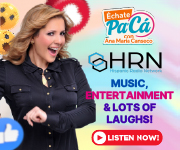How One Latina Entrepreneur Founded An Award-Winning, Female-Led PR Company
May 6, 2020
By Court Stroud
She dreamed of becoming a librarian.
As a child, Natalie Boden would spend hours organizing books on her shelves. She even developed her own card catalog filing system.
The Honduran native today is the founder and President of BODEN, a public relations and social media agency which counts McDonald’s, Target and UnitedHealthcare among its clients.
The bibliophile little girl has grown up to become quite the successful woman. PRWeek inducted her into the 2020 “Hall of Femme” class earlier this year. She’s on the Latin Grammy Cultural Foundation committee and serves on the Board of Directors for CMC, the Culture Marketing Council.
Boden even now maintains a collection of books, including sections for business, female empowerment and children’s literature. Calling her library “my pride and joy,” she admits to still keeping a card catalog file.
In this interview, the Miami-based business leader talks about her path to entrepreneurship, the importance of “leading with culture” to reach the U.S. Hispanic marketplace and what her firm is doing to help brands during the COVID-19 crisis.
This interview has been lightly edited for clarity.
The part of you that wanted to be a librarian—do you see her dreams in your business work today?
The love of books, of stories, of words that draw you in, are certainly part of what we do today at BODEN. We use words to sell, which I think is the perfect blend of what I loved as a child—storytelling and selling. Other than a librarian, I always knew I’d be an entrepreneur. I had great examples in my parents and my grandmother. That’s what drove me to set up lemonade stands when I was seven and sell cakes at my parents’ store. No matter what I would have done in life—even as a librarian—I would’ve figured out a way to generate revenue from it. It’s in my blood.
How did you start your firm?
It started organically, on my own, a client or two. My first client was The Miami Parking Authority, $1,000 per month. I was subcontracted by a larger agency. I then got our first set of small retainer clients and hired my first employee. We’ve grown organically since then. When we won our first pieces of Fortune 500 business, Target and then McDonald’s, we were in a 900-square-foot office. Several years later, we won the Hispanic Public Relations Association’s “PR Agency of the Year” and then PR News’ “Best Places to Work” in 2018. This year, we’ve won a PRWeek “Hall of Femme” Award, as well as signing on DishLATINO and L’Oréal’s Dermablend. It hasn’t been without its ups and downs, but I’m certainly proud to be where we are today.
As an independent PR company, what’s the competitive advantage that helped you grow from a team of three during the last financial crisis to 25?
We use our independence to our advantage. Our clients often say we are the perfect blend of the standards of a global agency, with the creativity and speed of a boutique agency.
What do we do well? We understand how to generate trust. You cannot buy your way to trust, you must earn it. Many brands, when thinking multicultural or Hispanic, immediately turn to paid media and advertising. And whereas that is extremely important, our approach is an earned media-first approach. All our initiatives, whether they be sales-driven or purpose-driven, generate earned media and build brand advocacy. We are trusted by the press, by influencers, by organizations, by community leaders. That gives us an edge.
Your company’s stated mission is “to help global brands lead with culture.” What does “lead with culture” mean?
There’s a famous quote by author Shaun Hicks: “Only someone wishing to disappear would ever strive to fit in.” When it comes to Hispanic, many brands want to develop a Spanish language ad, hire a Hispanic celebrity, sponsor a soccer tournament, or develop a recipe with a “Hispanic” ingredient. Suddenly trying to fit in and be safe is the strategy.
Leading with Culture is about being bold, being first out the gate with an insight that is true and authentic and inspiring. And to lead, and to be bold, you have to ask yourself, “What is the legacy you want to leave with this segment? What is the long-term purpose-driven strategy?” Leave one-off Hispanic Heritage celebrations to the followers.
What does diversity and inclusion mean for you on a granular level?
D&I is not about checking the box. It’s a question of what an organization believes in, and the impact it has on its stakeholders: employees, consumers, communities and suppliers.
As marketers and communicators helping support some of the leading brands in the world, we have the ability to continue to invest in the sectors of society that are the most vulnerable, that are in need of our help. It’s not a creative imperative. It’s a moral imperative and a business imperative, because by investing in these groups we will not only continue to prosper as businesses but also as a society and a country.
Does your emphasis on diversity have to do with your past?
There is no doubt that my upbringing has to do with what I do today. Growing up with an English father and a Honduran mother of Palestinian descent made our household incredibly multicultural. I didn’t really know it at the time, but I realize it now.
My father instilled that love of culture in all of us. I was reading The Economist by the time I was 12. The Berlin Wall fell in 1989 and we were there the following year. Whether it was in my African American Literature or European Politics class, I knew I was somehow going to do something that helped others understand the importance of culture. What that was, I didn’t know.
What’s the worst day of your career?
A few weeks ago—when all came to a grinding halt. The lockdown began as a result of COVID-19, and, as business leaders, we were faced with an avalanche of challenges. That first week I had to make tough decisions, plan for all contingencies, make sure our employees were safe, ensure continued excellence service to our clients, while turning outwards and asking ourselves how we could support our Hispanic community—all while ensuring my own family was safe.
The thought of having to lay off personnel, furlough or cut salaries was dreadful. I ended that first week with my head buried in my hands, thinking of all that could happen. Thankfully, we’ve been able to ensure that no furloughs, layoffs or cuts have had to be done, except to my salary.
I can’t think of any other time in history as bleak as this one—and I lived through the dot-com crash, 9/11, and the 2008 recession. And much like a tsunami, it came in one big blow.
But as they say, “Anyone can lead when the plan is working. The best lead when the plan falls apart.”
What’s the best day in your career?
For Boss’s Day last year, I received a gift from the team at BODEN—a pair of Reebok shoes that read “It’s a Man’s World” but with the words crossed out. It was great to realize how well our team knows me. I love sneakers and I’m a staunch feminist. There were also several balloons with a personal message from each person on it. As leaders we strive to be the best we can be for the business, our clients, our employees, our communities, our families—and we know we don’t always get it right. In that moment I thought, “I must be doing something right.”
Talk about the launch of BODEN’s Covid-19 Hispanic Public Relations Resource.
It’s important to support our Hispanic community, and today they need the help of both the private and public sector more than ever before. So, we did what we do best and built a PR resource. We brought our team, friends in the media and Hispanic celebrities together to launch the COVID-19 Hispanic Public Relations Resource. This resource provides insights from the top Hispanic journalists, influencers and experts from around the country. It also includes a downloadable list of stakeholders including media companies, celebrities, organizations and social media influencers.
It will help brands broaden their message of health and wellness to the right stakeholders, helping them make a positive impact across the Hispanic community. The Hispanic community constitutes an economic, social and political force in the U.S. Nevertheless, it faces a great threat from the COVID-19 crisis as a result of various socio-economic factors, including lack of health insurance and lack of trust in the healthcare system. This resource is our way of giving brands insights to the most important voices in our community right now, as well as ways brands could help support this 50+ million Hispanic segment.
 Follow Court Stroud on Twitter or LinkedIn or check out his website.
Follow Court Stroud on Twitter or LinkedIn or check out his website.
PHOTO CREDITS: BODEN



























